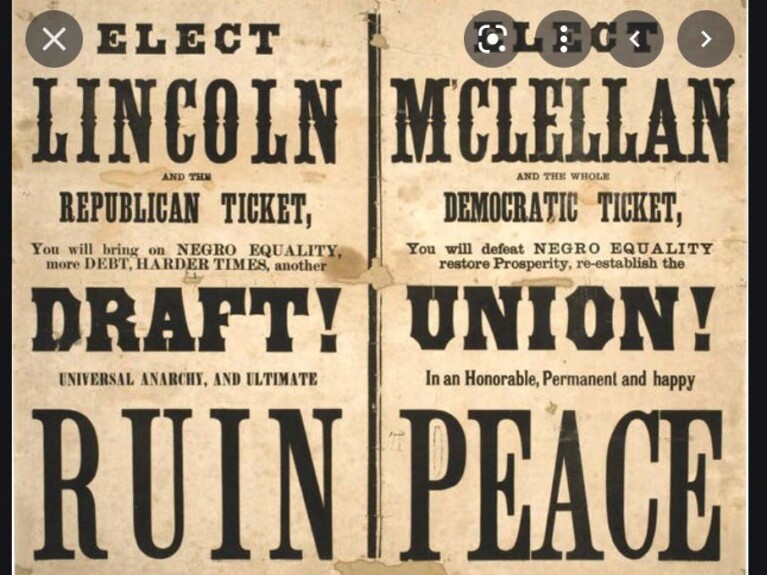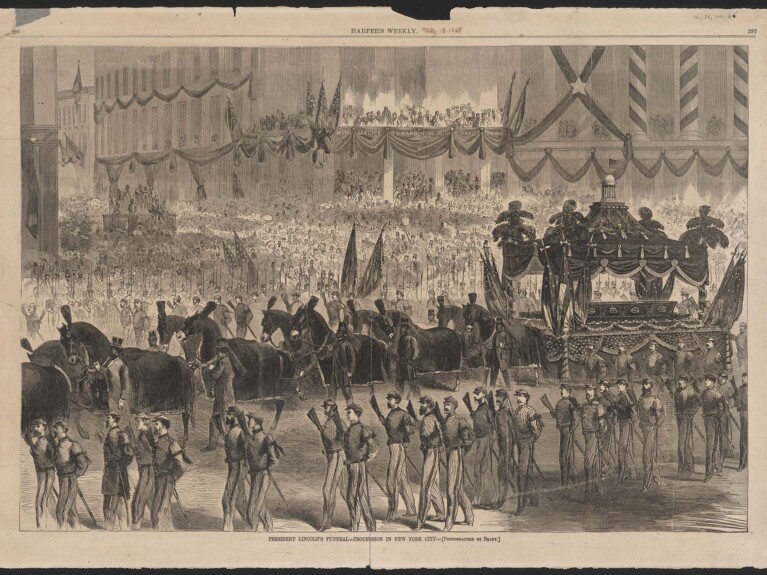Fall of Richmond
1865-04-10. Another letter full of jubilation, this one reporting the fall of Richmond, North Carolina and the routing of the Rebel armies. It includes vivid descriptions of the celebrations of citizens in the north and the black northern troops who were chosen as the first to March into Richmond.
Thomas Jackson indulges his sarcasm for those who had said that a resolution of the war could not be achieved by force of arms alone while also expressing his distaste for the English Tories whom he views as dastardly supporters of the confederacy. He concludes “We have finished up your (i.e. British) mean business of British blockade runners most entirely”
Reading Penna April 10. 1865. (extract)
12 Oclock at noon
Dear Cousin,
I have been about to write to you several times during the last three months, but I have had so many things to attend to, and such great events came and coming to pass in this great country, that I could not collect my scattered ideas enough to quietly sit down and write you an intelligible and coherent letter that would be interesting and do any thing like justice to the vast events of the great American war that have happened of late. But, as we say “make or break” I must attempt it now.
In my last letter I told you that in 6 months we could take Savannah, Wilmington and Charleston and effectually close every port in the rebel states against your rascally blockade runners. We have done all I promised you on that score most completely. We have finished up your mean business of British blockade runners most entirely and we have done much more within that 6 months.
We have so used up our aristocratic slaveholding liberty-hating rebels that they are now quite beyond the help of British benevolence, and your tory sympathy can serve them no more, unless it kindly receives such as escape from America to wander over the world branded traitors to human freedom without a country or a home.
I suppose my lord Wharncliff and such like noble men will take pleasure in giving a kind welcome to these American gentlemen whom we naughty northern workies and “mudsills” have driven out because they broke our laws, attempted to break up our free government, divide and subdivide our country and inflict upon us a worse fate than that of the serfs and trodden down classes of Europe. But when my lord welcomes these gentlemen (gentle as sucking doves no doubt, now they are vanquished) let him reflect that for over a year they have been trying to coax us to acknowledge their independence and then join them in a war against England.
These Same Southern gentlemen, are far more bitter against you British people because you would not allow your government to intervene in their favor, than we are against your tories & aristocracy for the underhand, mean money making assistance they gave them. They would make war on your whole nation at once if they had the power.
We have the power now. But bad as your Tories have treated us, we shall not declare war against you. But we shall put an export duty of a shilling a pound on our cotton, and thus compel you to aid in paying off the debt you have so largely assisted in putting upon us. We shall do this, not because we are afraid of you, or at all doubt our ability to punish your tory aristocracy severely. But we should also inflict suffering on your people who have been our friends and wished well to our cause. So we “calculate” that an export duty on our cotton will be better for us and cheaper for you than the bloodshed and cost and waste of war. Please excuse this digression. I could not help it. But I will now tell you of what I see and hear. We have had about two weeks of wild and extraordinary excitement.
About the 29th of march General Grant commenced his grand attack on the great rebel army around Richmond and Petersburg. For 3 or 4 days the battle was terrible and severe. The rebel leaders knew well that the last great tug and trial was upon them & they plied their men with whiskey until they fought with the maddened desperation of devils. The slaughter was awful but slavery could not conquer. Liberty was triumphant.
General Lee saw his army cut up and beaten back at all points. On Sunday morning April 2nd he sent to tell Jeff Davis that Richmond must be evacuated immediately, for he could keep the Union army back no longer. The dispatch reached Davis while in church, mocking the most high with his hypocritical prayers. Then the great skeddadle commenced. The whole confederate government vamoosed with most indecent haste. All idea of dignity was done with. It was a regular irregular helter skelter devil take the hind most.
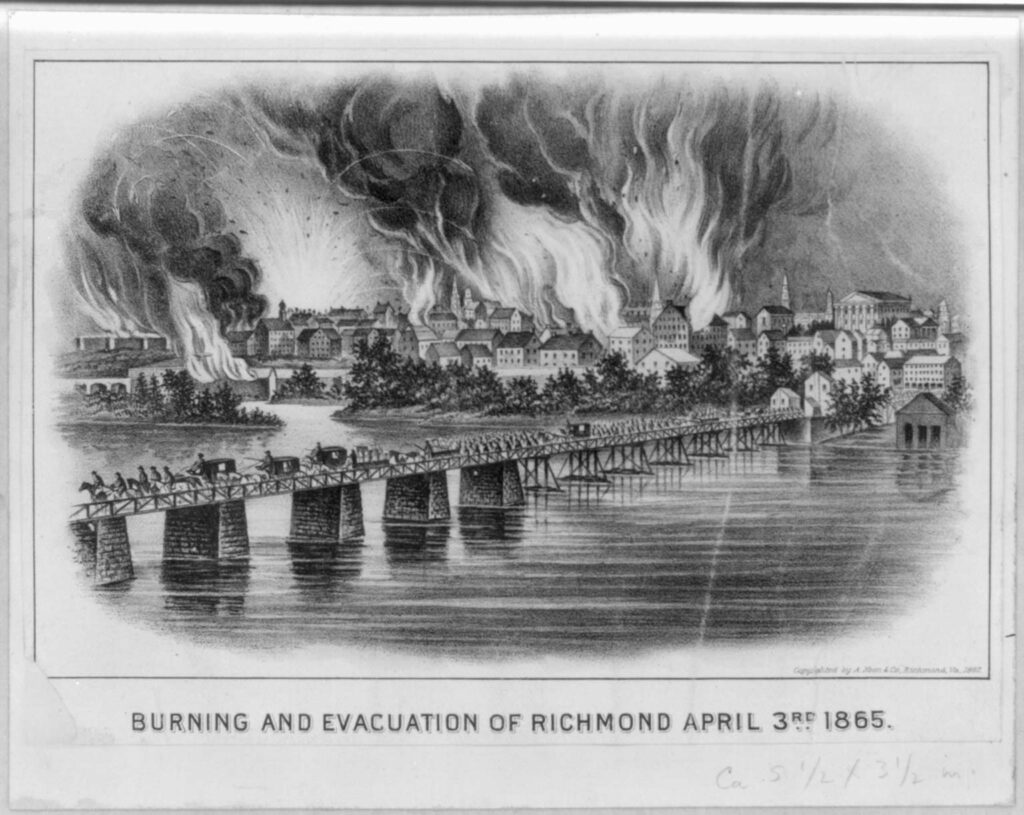
Everyone tried to get away at once. Residents and soldiers burnt all valuable resources that they thought might benefit the invading federal forces. Source: Library of Congress, Photographs and Documents Division. https://hdl.loc.gov/loc.pnp/pga. 08655
The news papers describe it better than I can. It was a trying time for the “first families of Virginia” and southern aristocracy generally. They set fire to all the flour mills and store houses, the navy yard, the rams and iron clads and did their best to destroy all they could to prevent it falling into possession of the union forces. It may be very interesting to your southern loan holders to learn that the rebel treasury was turned out into the streets. Bundles of confederate bonds were strewed around in all directions. The boys picked up millions of dollars of them and hawked them about and sold them as waste paper and sold them for about a penny a pound English money. So much for that speculation. I rather think some of your English southern sympathizers are sorry now that they did not profit by the warnings we gave them.
Sunday, April 3. 1865, was a day that will never be forgotten in Richmond, nor the night following either. They cleared out of Richmond none too soon, and the upshot showed that General Lee stayed around there too long to escape. On Monday morning, April 3rd the Union troops took possession of the city and the first men that marched in was a whole brigade of black soldiers. Here was a severe slap. The capital of the great, vaunting taunting boasting southern confederacy taken by – “niggers” – Great blackfaced, thick lipped, flat nosed, woolly head, long heeled niggers – How oh! how are the mighty fallen – what a falling off was there -and what a putting on too. “Niggers”. “Black niggers” with bright bayonets and muskets gleaming in the morning sunlight, marching in solid phalanx and battle array, right into the very sanctuary of all that is deemed by your aristocracy sacred and respectable on this on this far off continent.
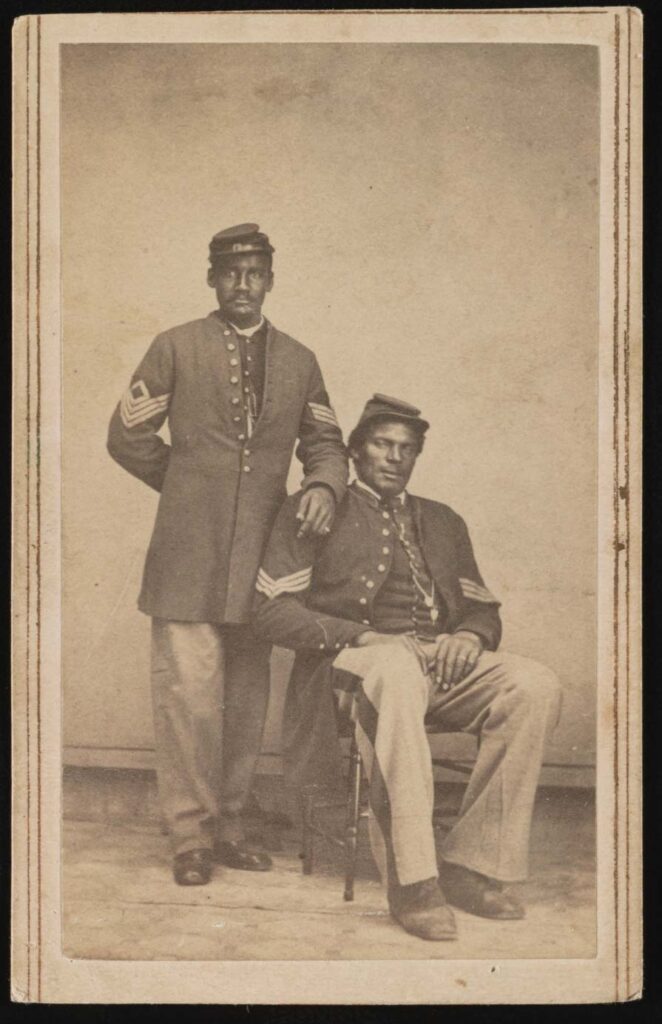
Two African American soldiers in Union sergeant’s uniforms From 1863 onwards, African Americans were actively recruited to help fight the confederacy. Thomas Jackson had felt that they should be offered this opportunity all along and clearly his words in this letter reflect his pride that Black troops were the first to head into Richmond which until that day had been the center of repression for slaves. Source: Library of Congress, Photographs and Documents Division. https://hdl.loc.gov/loc.pnp/ppmsca.41852
And what of the faithful slaves who were to be armed in defense of their kind masters and their own bondage, and fight for the confederacy and the better securing of their own shackles?. Did they rush to arms and drive back the barbarous black invaders of the sacred city? – No. Not a bit of it.
They run and jumped and gamboled and danced for joy. They kissed and hugged and welcomed the brave blacks as friends, brothers and deliverers. The little picanninies climbed around their legs, kissed their hands and chattered in wild wonder at such a strange sight. The black women fairly screamed with glee and uncontrollable delight and embraced the sable battle scarred brave warriors with all the warm fervor of long and heartfelt affection. Oh! that marching of our brave black men into Richmond must have been a glorious sight, a splendid spectacle. I would have given almost a world of wealth to have witnessed it -. arm slaves in defence of slavery – Oh! what a just and god directed retribution for such a daring diabolical and develish idea, what a well deserved punishment for such an impious proposition.
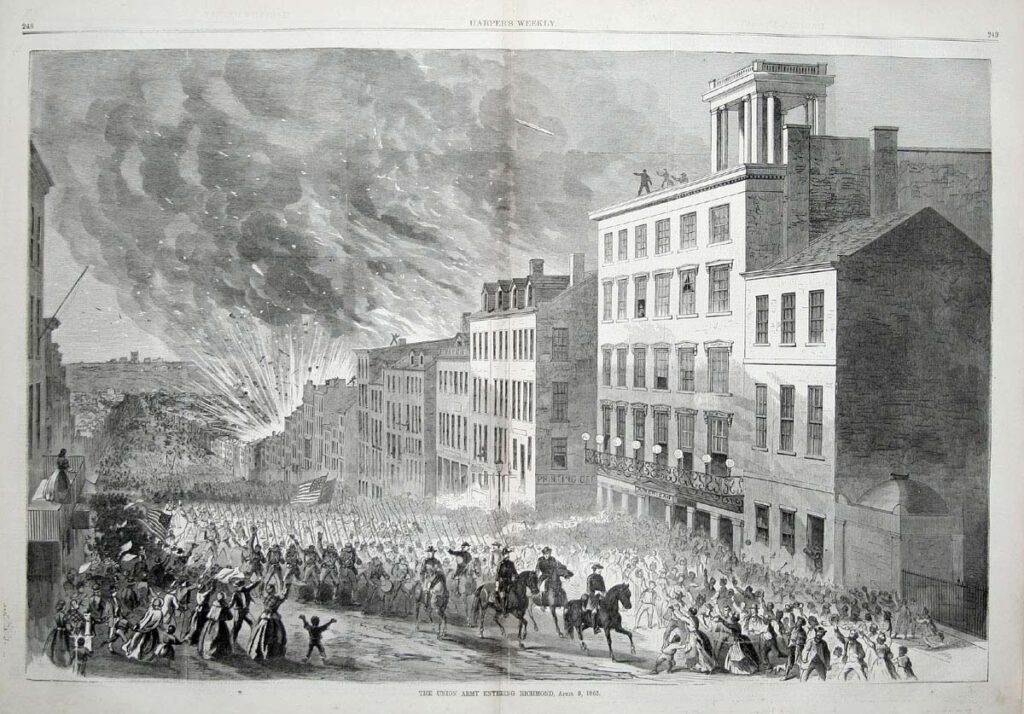
The victorious Union Army entering Richmond, April 3, 1865 This illustration reflects Thomas Jackson’s description of the jubilation of the crowd. The artist was not present at the time and created this image on the basis of reports from the scene as was often the case in such circumstances. With the technology of the times, it took about 2 weeks to prepare the images for engraving and printing, as seen in the date of publication. Source: Harpers Weekly Magazine. April 22nd, 1865, p. 248.
But our great war has taught many such terrible lessons. Look at the sad fate of Charleston, where the first gun was fired at our flag and defiance so insolently and haughtily hurled at us. The business half of the city battered to pieces with union bombshells. Grass growing in its deserted streets and wild animals frequenting its fine walks and flower gardens. Look again at the sad fate of Columbia the capital of South Carolina, the first state to secede and begin the war. When the rebels evacuated Columbia they strewed the principal streets with opened cotton bales. Set fire to it themselves. The wind carried the blazing cotton onto the buildings, three thousand houses were burnt down in one night and full half of its inhabitants homeless. So it has been with other towns and cities in the slave states. They burned our beautiful town of Chambersburg, and our armies have retaliated by forcing them to burn ten times as much of their own property and compelled them to kindle the fires with their own hands. So vengeance is meted out to man-stealing traitors here in free America.
On Monday afternoon, April 3rd we got the news here of the capture of Richmond. We had before had the wild cry “Wilmington is ours” -Savannah is ours” and when Charleston went and Fort Sumter fell back into the union we had a long loud hurrah and great rejoicing generally.
But when the wires flashed the words “Richmond is taken” we had a perfect storm, a roaring tornado from thousands & thousands of throats, and near a whole week of congratulations on the capture of impregnable never to be had Richmond. 5 or 6 months ago, good, honest hearted, old fashioned democrats had very knowingly shook their noddles and with a deep sigh said “Richmond can never be taken” “The siege of Richmond will have to be raised” “The union can never be restored by war” “It can only be restored by conciliation compromise and negotiation”. “Richmond has 7 lines of strong fortifications defended by over five hundred heavy guns and immense stores of ammunition, Oh no, never, never, never be taken”. But it is taken, and held, and the 500 great guns are ours, and all the vast stores of ammunition are destroyed. And so anxious were the rebels to destroy that ammunition, that traitor Breckenridge ordered a magazine to be fired that was close by the Richmond poor house, without giving the poor paupers time to escape, and the explosion killed and wounded some hundreds of the poor creatures. Such is the story we have. And it is most likely true, for a slaveholder cares far less for a poor white man than for his black slave. In fact he cares All for the black slave & nothing for the free white.
Well, Lee retreated towards Lynchburg with the shattered remains of his rebel army. After a weeks weary march and a continued skirmishing fight all the way, he had got about 80 miles from Richmond, when a strong union force of cavalry and Infantry and artillery headed him off, captured most of his wagon train, many of his guns and men, and on Sunday April 9. obliged him to surrender himself and the remnant of his army, about 32 thousand men, prisoners of war, to avoid entire annihilation.
The news reached here by telegraph about 12 Oclock the same night. And then began such a hubhub and uproar as I never saw before and never expect to see again. The church bells were all set to ringing, and every other bell in the city that would ring or swing at all. Although midnight nearly every body was soon out of doors. Bonfires blazed at the corners of the squares, in many parts of the town. Cannon were firing Salutes in the main and several other streets.
About 2 Oclock this morning a public meeting was organized in the court house. But this time not to prepare for defense against a cruel, haughty and insolent foe. That foe had fallen never to rise again, and there were no such stern and anxious faces as I had seen there before at hasty and unexpected meetings when this same General Lee was a powerful invader of our state at the head of the great rebel army of Virginia. That powerful army was now broken, scattered and captured and General Lee himself a prisoner of war.
Our people were wild with delight crazy with joy. They screamed and shouted, whistled and whooped and men hugged and kissed each other who were but slightly acquainted before. It seemed as if all the faculties of fun, frolic & boisterous enjoyment long restrained were now cast loose without the merest semblance of let or stint. All the firemen turned out in full uniform. The steam fire engines, Hand fire engines and Hose carriages were brought forth. Cannon were mounted upon wagons. and although it was a dismal rainy night overhead & very muddy underfoot, lanterns were lighted a long procession was formed and perambulated all the principal streets of the city, shouting, singing and firing salutes until near day light. When morning came, all the Stores, shops and manufacturies and business places remained closed, all work was stopped and a general holiday inaugurated by common consent.
All seem to feel that in the taking of the rebel capital, the defeat and capture of their main army, and their commander in chief of all their rebel forces, the head of the rebellion is cut off, it is crushed out and the war at an end as far as the great armies engaged in it are concerned. Such is the feeling among all the American people & the same scenes of rejoicing and gladness were going on at the same time in every city, village, town, and hamlet of all the loyal states. In Philadelphia, Baltimore, New York, Boston. Pittsburg. Cincinnati, and all the large cities they had immense turn outs.
We have some of the particulars of the great battle before Richmond surrendered, from our rope walk men who were in them. Herman Selig was wounded. A musket ball through both legs. Making only a flesh wound though and he is now in one of the hospitals at Washington doing well. We know that Mathias Bachtold, Henry Granger, Lewis Neiman and my next door neighbour were in the army corps which stopped Lee’s retreat and compelled his surrender. We have not heard that any of the four were hurt.
I must close now. But I will write you again soon. I got your honored Father’s photograph & will write to him & send mine shortly. If I live I shall come to England before long and see you all.
With love to all
I am as ever yours affectionately
Thomas Jackson
Reading Penna April 10. 1865. 12 Oclock at noon
